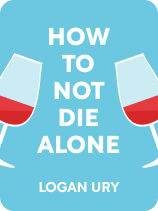

This article is an excerpt from the Shortform book guide to "How to Not Die Alone" by Logan Ury. Shortform has the world's best summaries and analyses of books you should be reading.
Like this article? Sign up for a free trial here.
It’s great if you find someone you want to spend your life with—but what if you aren’t sure that this person is the one? How do you know when your relationship is over?
Staying in a relationship that’s no longer working for you is the direct route to unhappiness. On the other hand, ending a relationship prematurely because the initial high has worn off is also not a good idea.
In this article, we’ll discuss the challenges of ending a relationship and how to make that process as painless as possible—if you decide that’s the right thing to do.
Why You Struggle to End Your Relationship
How do you know when your relationship is over? When it comes to ending a relationship, people often have one of two types of unhelpful tendencies. The first tendency is to drag out relationships they know aren’t working because they’ve already invested time into the relationship. But in doing so, they forfeit the time they could be spending building a better relationship with someone else.
(Shortform note: If you’ve been dragging out your relationship because you want a big commitment from your reluctant partner and don’t want to start over, don’t issue an ultimatum. Experts explain that by forcing your partner’s hand, you risk initially getting the answer you want—then later having a partner who leaves you because they resent that you pressured them into commitment. If so, you’ll lose even more time you could have spent building a better relationship with someone else.)
The second tendency is to leave perfectly fine relationships because the initial high of a new relationship wears off. But in doing so, people forfeit the ability to learn how to be in relationships long-term.
(Shortform note: If you’re used to leaving relationships too soon, you may struggle to evaluate whether you’re in a good relationship that can teach you how to be in one long-term, or in a mediocre one you’re better off leaving. Experts suggest that if you communicate well, respect each other, and have fun, you’re in a good relationship. In contrast, not wanting to tell them important information or not appreciating them might indicate it’s time to leave.)
How to End the Relationship
Once you’ve decided to end the relationship, how do you actually do it? Ury argues that the key is to make a plan, as research suggests that people are more likely to follow through on their goals if they make a plan for doing so.
First, plan what you’re going to say: Compassionately communicate that the relationship isn’t working, but don’t name specific reasons, as this will likely lead your soon-to-be ex to obsess over whatever you say.
Second, schedule both the breakup and its immediate aftermath. Select a time to have this conversation that works for both your and their schedule. Allow yourself up to 90 minutes, but then have something else to do—like drinks with your best friend—so that you can avoid dragging out the breakup unnecessarily.
| Ending the Relationship as Kindly as Possible Some couples schedule and plan for a breakup together. After realizing that they’re incompatible, they’ll plan to break up in a few months, enjoy the time they have left, and then break up on a pre-planned date. But this strategy has mixed outcomes. Some couples remain together, while others follow through on their breakup. And if one partner was never fully on board with the breakup, this can lead to disappointment and heartbreak. But if you’re like most people and are unilaterally ending your relationship, experts have further recommendations for doing it kindly. Never use cliché lines like “It’s not you, it’s me”—such lines will trigger your ex to obsess over why you actually broke up with them, since they know these cliché lines are meaningless. And if you’re worried that your partner will react in an emotionally unstable way that leads to a too-long conversation, consider scheduling your breakup in a therapist’s office or around the schedule of a close friend who can help your partner process the news. |

———End of Preview———
Like what you just read? Read the rest of the world's best book summary and analysis of Logan Ury's "How to Not Die Alone" at Shortform.
Here's what you'll find in our full How to Not Die Alone summary:
- A science-backed approach for finding the true love you’ve always wanted
- How your patterns may be sabotaging your quest for true love
- How to effectively navigate the twists and turns of a relationship






